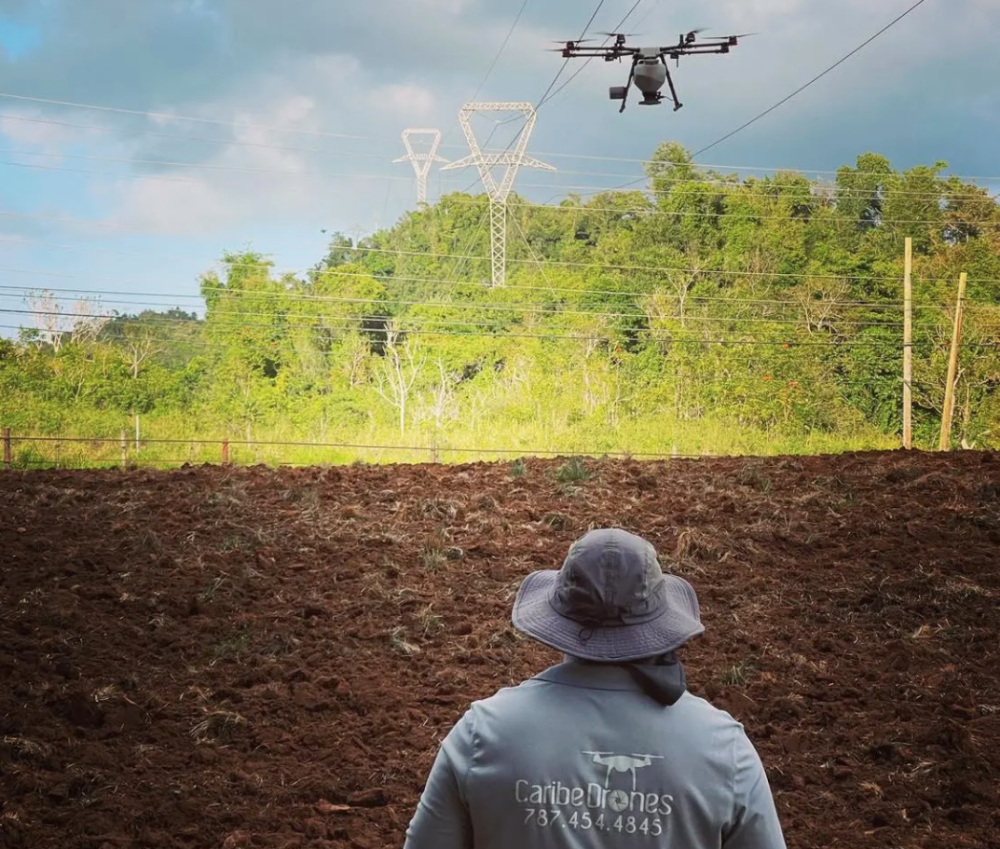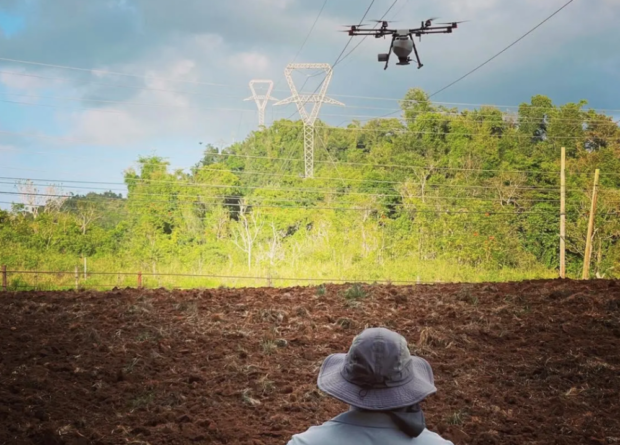Ramon Pagan is just one of hundreds of aviation entrepreneurs whose businesses have been held up on the runway by the FAA’s struggles with a rising number of applications for certification to operate.
In 2020, Pagan, an operator of aerial-mapping drones in Puerto Rico, thought he had an idea that would be good for his business, Caribe Drones, as well as for the welfare of the island, which imports over 80% of its food. He spent about $20,000 to buy two DJI agricultural drones capable of spreading herbicides, fertilizers and seeds. He needed certification from the Federal Aviation Administration to operate them, so he applied. And he waited. And waited. Every couple of months, he received a letter from the FAA telling him that there were hundreds of others ahead of him to be processed before his application would even be reviewed.
In late April, after about two-and-a-half years, he finally cleared the last major step: FAA inspectors traveled from Texas to evaluate how he operated the drones. Pagan says the FAA staffers were apologetic, but told him that some applicants seeking approval for businesses using manned aircraft have had even longer odysseys.
“They were saying, you should feel okay because the wait wasn’t four years, it was just two,” Pagan told Forbes. “I was in shock.”

An employee of Caribe Drones flies a DJI MG1P agricultural drone in Puerto Rico.COURTESY OF CARIBE DRONES
A prime contributor to the delay is the spike in the number of people, including individual farmers, applying to use agricultural drones. The FAA is also seeing more applicants looking to hire out private planes for charter service, a practice that’s surged in popularity since the pandemic raised anxieties about commercial flights.
The same workers who handle those applications at the agency’s network of over 80 local Flight Standards District Offices also oversee private flight schools, which are complaining it’s taking too long to get certification for their curricula, which allows the schools to enroll foreign students and military veterans, some of whose expenses are covered by the government. With demand booming amid a pilot shortage, flight school certification is taking two to three years, according to Bob Rockmaker, head of the Flight Schools Association of North America.
Exacerbating the pilot shortage, student pilots and pilots seeking new ratings are also facing serious delays in scheduling flight tests with FAA-approved pilot examiners, outside contractors who are also overseen by the flight standards offices. It can take eight to 12 weeks, Rockmaker says. Pilot examiners are in short supply after some retired during the pandemic; others have been lured to airlines by higher pay. Examiners have also faced delays in getting FAA staff to conduct the periodic recertification flights they themselves have to pass, Rockmaker says.
It’s the latest sign of dysfunction at the agency. Over the past four years, the FAA’s ability to assess the safety of new aircraft has been called into question following the crashes of two Boeing 737 MAX planes. More recently, the agency has gotten flak for its oversight of national airspace after several near collisions between airliners at airports, as well as for widespread flight delays during peak travel periods, which airlines have blamed on a shortage of air traffic controllers.
The mounting backlog in certification applications has been causing more frustration with the chronically short-staffed and under-funded agency. Congress is weighing reforms this spring as part of a five-year reauthorization bill.
“They’ve got all kinds of problems, the FAA, all kinds,” Rockmaker says.
As of mid-March, there were over 700 applicants for operating certificates of various types waiting for the FAA to take up their cases, executives at the National Air Transportation Association say they were told by FAA staffers in a briefing that month. “For every one certificate that comes off their list, they get two added,” Alan Stephens, NATA’s vice president for regulatory affairs, says the FAA staffers told them. “They just can’t seem to get ahead of the game.”
It’s taking the FAA from one-and-a-half to two years to clear new entrants to the air charter business, according to NATA, up from nine to ten months before the pandemic.
Mike Rioux, a consultant who helps new airlines and charter operators navigate the FAA approval process, says it shouldn’t take more than two months to process the simplest type of air charter application, for single-pilot planes. “Something is broken,” he says.
The FAA declined to answer questions from Forbes on the extent and causes of the backlog. The agency said in a statement that it is “taking concrete steps to speed up certification applications and reduce the backlog,” including establishing certification “tiger teams” to support local flight standards offices. The FAA is “reprioritizing work to address a significant portion of pending applications by the end of fiscal year 2023,” it said. The agency is also aiming to add about 100 designated pilot examiners this year. It had 935 in 2022.
The certification delays are causing financial distress for some aircraft owners who are unable to make money on expensive assets but still need to keep current on loan payments. One plane owner who asked to remain anonymous because he’s worried about retaliation from the FAA said that in the nearly two-and-a-half years it took for the agency to issue him a charter certificate for a business jet, he burned through over $1 million, exhausting his retirement savings and forcing him to mortgage his home. As a requirement to win the certificate, he had to hire and pay a chief pilot and maintenance director. His plane, which sat idle, needed insurance, a hangar and scheduled maintenance.
“It was a mounting load of stress,” he says.
One of the biggest requirements of the certification process is to produce detailed manuals covering such things as how the business will operate its aircraft and train staff. He says in his case they totaled over 1,000 pages. An inexperienced inspector and a glacially slow revisions process were the biggest holdups, he says.
“I would get an email about something needing to be changed and I would jump through hoops to get it back to them quickly,” he says. “I’d wait a month or six weeks for them to respond.”
The skies are only going to get busier — and the FAA’s workload will only get heavier. More drone package delivery startups are expected to apply for certification as air carriers, and a slew of electric air taxi makers are hoping to launch passenger service starting in 2025.
One reason for the delays is the FAA has lost many operations and safety inspectors who are experienced pilots to airlines. They process certification applications as well as oversee businesses after they’ve been approved. The agency is offering $25,000 hiring bonuses to try to fill those critical positions.
An idea Rioux has advocated: the FAA could delegate to outside contractors the simplest charter certifications the same way it designates outside engineers to carry out large parts of the aircraft safety certification process.
The FAA could also relieve pressure on itself by drafting new certification requirements for agricultural drones, according to people in the industry. Currently, the agency is applying standards designed for manned crop-spraying planes. Before drone operators’ certification applications are even considered, they have to get waivers from the agency for rules that don’t apply to drones, such as requirements to have seatbelts, fire extinguishers and flight manuals in the aircraft.
Nathan Stein, an Iowa farmer who sells agricultural drones made by China’s XAG, is pressing members of Iowa’s congressional delegation to exempt farmers from much of the regulatory process so long as they operate drones on their own land at low altitude.
“These things aren’t flying more than 15 feet off the ground,” says Stein. “My tractor’s sprayer boom is more than 15 feet off the ground and I don’t have to have air clearance for that.”
Jonathan Rupprecht, a Florida aviation attorney, says the FAA could automate parts of agricultural drone certification. He also proposes linking flight safety employees’ compensation to the number of applications processed, along with metrics that track safety outcomes.
David Thirtyacre, a professor at Embry-Riddle Aeronautical University in Daytona Beach, Florida, submitted an application in June 2021 to start a course in how to use drones to precisely apply herbicides, insecticides and nutrients, which advocates say could revolutionize agriculture. Thirtyacre is worried his waivers will expire before the FAA gets to his case.
“The unintended consequence of a two-plus-year waiting period in order to get certification is that the people who fly illegally are getting paid and building their businesses,” Thirtyacre says. “Those of us trying to follow the rules end up getting penalized.”

